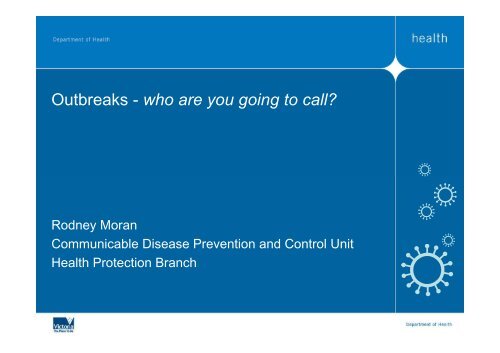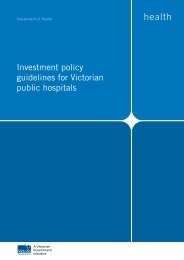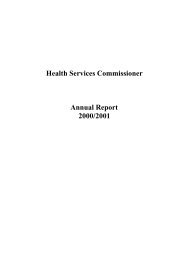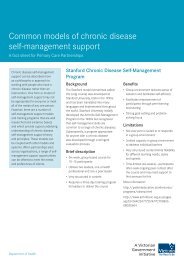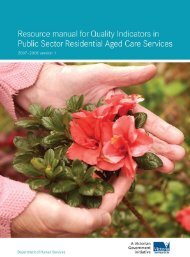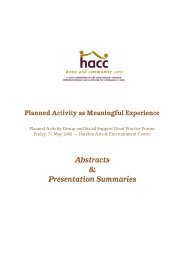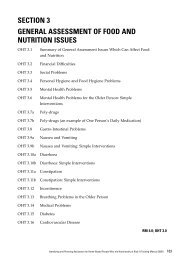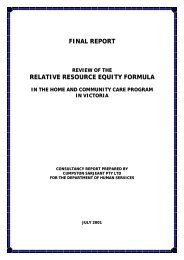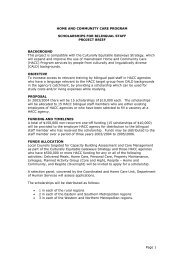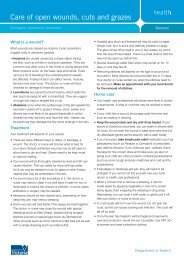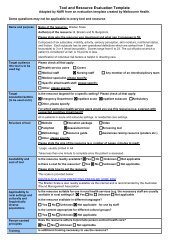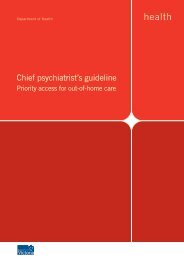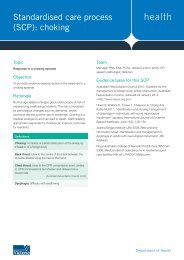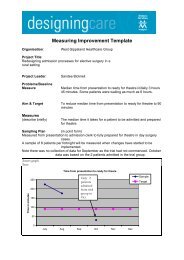Rodney Moran - Department of Health
Rodney Moran - Department of Health
Rodney Moran - Department of Health
You also want an ePaper? Increase the reach of your titles
YUMPU automatically turns print PDFs into web optimized ePapers that Google loves.
Outbreaks - who are you going to call?<br />
<strong>Rodney</strong> <strong>Moran</strong><br />
Communicable Disease Prevention and Control Unit<br />
<strong>Health</strong> Protection Branch
Who is CDPCU?<br />
• Unit within the Dept <strong>of</strong> <strong>Health</strong>, <strong>Health</strong> Protection Branch<br />
• Centralised surveillance and control unit<br />
– monitoring incidence <strong>of</strong> disease<br />
– outbreak detection and response<br />
– case management<br />
– research and evaluation<br />
– policy development and implementation<br />
– public health advice and education<br />
• General responsibilities <strong>of</strong> the CDPCU include<br />
– formulating policy and program standards for the prevention and control eg.<br />
gastrointestinal illness<br />
– maintaining a surveillance system for notifiable infectious diseases in Victoria<br />
– developing and coordinating appropriate education and prevention strategies<br />
– providing expert advice on infectious diseases issues<br />
– providing public health emergency response to infectious disease outbreaks<br />
– coordinating and delegating the investigation <strong>of</strong> single incidents, clusters and<br />
outbreaks <strong>of</strong> gastroenteritis<br />
– notifying the Victorian State Coroner <strong>of</strong> any deaths associated with an outbreak
Make up <strong>of</strong> CDPCU<br />
• Six programmes within CDPCU<br />
– Investigation & Response Section<br />
– Epidemiology Section<br />
– Policy, Planning & Information Section<br />
– TB control Section<br />
– Immunisation Section<br />
– Office <strong>of</strong> the Assistant Director<br />
• Multidisciplinary team<br />
– Environmental health <strong>of</strong>ficers, epidemiologists, public<br />
health clinicians, policy <strong>of</strong>ficers, public health nurses and<br />
trainees to name a few
What is an outbreak and who do you call?<br />
• For gastro<br />
– 2 or more cases <strong>of</strong> vomiting/and or diarrhoea amongst<br />
residents/patients and/or staff (that cannot be explained by<br />
medication or other medical conditions) within 72 hours in a setting<br />
that makes epidemiological sense<br />
• For respiratory illness<br />
– 3 new cases <strong>of</strong> respiratory disease within 72 hours<br />
• Call the <strong>Department</strong> <strong>of</strong> Communicable Disease Prevention & Control Unit<br />
– Ph: 1300 651 160<br />
(Number above voice message provides contact details for our on call public health<br />
<strong>of</strong>ficer)<br />
• Recommended you also advise Cwlth Dept <strong>of</strong> <strong>Health</strong> and Ageing
Notification and law<br />
• The Public <strong>Health</strong> and Wellbeing Act 2008 requires medical practitioners<br />
and pathology services to notify a number <strong>of</strong> conditions to the <strong>Department</strong><br />
(prescribed conditions in regulations)<br />
• The list includes “two or more related cases <strong>of</strong> food or waterborne illness”<br />
(to be notified on suspicion). Information about notification requirements is<br />
available at http://www.health.vic.gov.au/ideas/notifying/howto<br />
• Although outbreaks <strong>of</strong> viral gastroenteritis is not required to be reported by<br />
law, this is strongly encouraged on a voluntary basis as it is <strong>of</strong>ten difficult<br />
to distinguish whether the illness is being spread person to person, or from<br />
contaminated food or water
Why is it important to notify?<br />
• A viral gastro outbreak in 2002<br />
closed the emergency department<br />
<strong>of</strong> a major hospital for several<br />
weeks and affected >15 wards<br />
• One nursing home outbreak had<br />
22 cases in residents. Illness was<br />
found to be due to food served at<br />
the facility. Coronial enquiries due<br />
to deaths<br />
• A campylobacter outbreak in a<br />
nursing home resulted in 3 staff<br />
being hospitalised and a<br />
workcover case being mounted<br />
against the facility<br />
• A salmonella outbreak in a hospital<br />
affected 15 young children and<br />
was believed to have been spread<br />
person-to-person by health care<br />
staff
Basic roles and responsibility<br />
• DH (CDPCU and Region)<br />
– Coordinate response<br />
– May assist onsite<br />
– Review findings<br />
• Council<br />
– Onsite attendance to review cleaning, hygiene, food<br />
preparation, & collect samples/specimens<br />
– Provide advice<br />
– Respond to identified issues
DH roles and responsibilities<br />
• The role <strong>of</strong> CDPCU during outbreak investigations includes<br />
– circulating an incident report within 24 hours <strong>of</strong> the outbreak being notified<br />
– managing and coordinating the investigation <strong>of</strong> gastroenteritis outbreaks and the<br />
investigation teams<br />
– liaising with OzFoodNet, Communicable Diseases Network Australia, the <strong>Department</strong><br />
<strong>of</strong> <strong>Health</strong> and Ageing and other public health authorities<br />
– liaising with public health laboratories<br />
– liaising with the FSRAU with regard to foodborne outbreaks, and EHU for waterborne<br />
outbreaks<br />
– requesting information and action from REHOs and local government EHOs relating to<br />
the outbreak (for example, infection control measures, audit reports, FSP compliance,<br />
premises inspection, process information, written reports, food and faecal samples,<br />
interviews)<br />
• For successful and effective investigation <strong>of</strong> gastrointestinal illness and outbreaks, it is<br />
necessary that all involved parties work together as a team<br />
• Responsibilities for the investigation and management <strong>of</strong> the public health aspects <strong>of</strong> cases<br />
and outbreaks <strong>of</strong> gastrointestinal illness are shared by the department and local government
Gastro Guidelines<br />
• This publication provides a comprehensive<br />
guide for those involved in the<br />
investigation <strong>of</strong> a number <strong>of</strong> infectious<br />
diseases causing gastroenteritis<br />
• It guides investigators from the time the<br />
incident is detected, through the<br />
investigational requirements, to the<br />
implementation <strong>of</strong> control measures
Why do we investigate?<br />
• Prevent further transmission <strong>of</strong> illness<br />
• Provide information which can be used to control outbreak<br />
• Prevent similar occurrences in the future<br />
• Help identify populations at risk for a disease<br />
• Learn more about the disease including the impact <strong>of</strong> control<br />
measures
General management summary
What do we know?<br />
• Viral outbreaks are most common<br />
• Person-to-person transmission<br />
most common type <strong>of</strong> transmission<br />
in institutions<br />
• Food-borne outbreaks can be<br />
easily overlooked<br />
• Nursing staff usually adequately<br />
briefed – other staff not always<br />
• Staff exclusion and hand washing<br />
is <strong>of</strong>ten where outbreak control<br />
falls down<br />
• Identification <strong>of</strong> the source <strong>of</strong> an<br />
outbreak <strong>of</strong> illness is not always<br />
straight forward<br />
• Almost every outbreak will be<br />
unique in some way, requiring a<br />
degree <strong>of</strong> flexibility when<br />
recognising and investigating<br />
outbreaks
Outbreaks by mode <strong>of</strong> transmission.<br />
Victoria 2010 (n=557)<br />
Foodborne (35)<br />
Unknown (70)<br />
Person to person (452)
Viral and suspected viral outbreaks by setting<br />
2010 (n=459)<br />
Residential facility (26)<br />
Hospitals (108)<br />
Child care (48)<br />
Other (12)<br />
Aged Care (265)
Foodborne outbreaks by setting.<br />
Victoria 2010 (n=35)<br />
Restaurants (6)<br />
Private residences (6)<br />
Community (2)<br />
Aged Care (18)
Outbreaks in Aged care settings by aetiology<br />
Victoria 2010 (n=319)<br />
Clostridium perfringens (3)<br />
Rotavirus (2)<br />
suspected viral (86)<br />
unknown (44)<br />
Campylobacter (2)<br />
Salmonella (3)<br />
Norovirus (177)
Outbreaks <strong>of</strong> Norovirus/suspected viral aetiology by quarter<br />
Victoria – 2005 - 2010<br />
Number <strong>of</strong> outbreaks<br />
250<br />
200<br />
150<br />
100<br />
50<br />
0<br />
1st Q 2005<br />
2nd Q 2005<br />
Norovirus suspected viral<br />
3rd Q 2005<br />
4th Q 2005<br />
1st Q 2006<br />
2nd Q 2006<br />
3rd Q 2006<br />
4th Q 2006<br />
1st Q 2007<br />
2nd Q 2007<br />
3rd Q 2007<br />
4th Q 2007<br />
1st Q 2008<br />
2nd Q 2008<br />
Notification quarter<br />
3rd Q 2008<br />
4th Q 2008<br />
1st Q 2009<br />
2nd Q 2009<br />
3rd Q 2009<br />
4th Q 2009<br />
1st Q 2010<br />
2nd Q 2010<br />
3rd Q 2010<br />
4th Q 2010
Number <strong>of</strong> outbreaks<br />
Foodborne outbreaks by aetiology (n=35)<br />
14<br />
12<br />
10<br />
8<br />
6<br />
4<br />
2<br />
0<br />
Salmonella Campylobacter Clostridium<br />
perfringens<br />
Listeria<br />
monocytogenes<br />
Aetiology<br />
Bacillus cereus Histamine poisoning Unknown
Food borne outbreaks<br />
• Food borne outbreaks in nursing homes / institutions<br />
increased over last couple <strong>of</strong> years<br />
• Can be difficult to recognise food-borne outbreaks in<br />
institutions<br />
• Predominantly associated with Salmonella or Clostridium<br />
perfringens<br />
– Preparing food ahead <strong>of</strong> service<br />
– Inadequate cooling and reheating<br />
– Inadequate hot holding/cold storage <strong>of</strong> meals<br />
– Use <strong>of</strong> gravies and soups / vitamised meals<br />
– Holding over <strong>of</strong> leftover meals<br />
– Inadequate equipment cleaning
Influenza<br />
• Key interventions for influenza outbreak control<br />
– Annual influenza vaccination <strong>of</strong> residents and staff<br />
• Keep line list <strong>of</strong> vaccinated residents and staff<br />
– Pneumococcal vaccination <strong>of</strong> residents<br />
– Outbreak recognition and management – report >=3 new cases <strong>of</strong><br />
respiratory disease within 72 hours<br />
– Institute appropriate infection control practices<br />
– Antiviral medication recommended for treatment and for prophylaxis<br />
<strong>of</strong> staff and residents<br />
– Have procedures in place for timely collection <strong>of</strong> appropriate<br />
specimens<br />
– Have procedures in place, endorsed by visiting GPs, for antiviral use
Contacting Us<br />
Communicable Diseases Prevention & Control Unit<br />
Telephone:1300 651 160<br />
(24 hours, 7 days a week)<br />
Website: www.health.vic.gov.au/ideas<br />
Email: infectious.diseases@health.vic.gov.au


